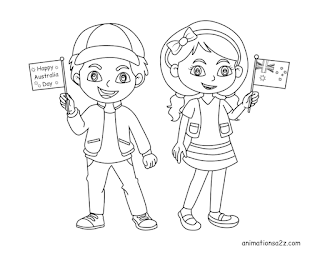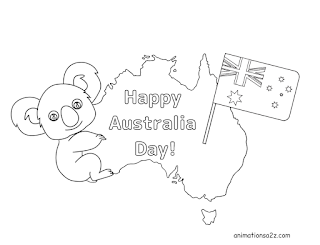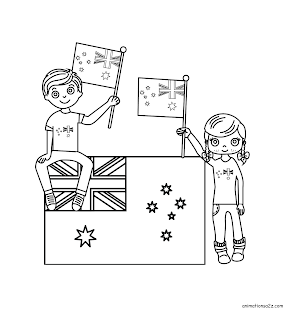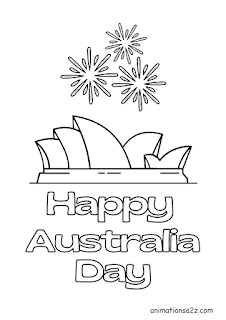Coloring pages for Australia day which observed annually on 26 January. Australia Day is the official national day of Australia. This day celebrates 1788 landing of the First Fleet at Sydney Cove and raising of the Union Flag by Arthur Phillip following days of exploration of Port Jackson in New South Wales. The coloring pages of Australia day should be painted in bright, happy and vibrant colors because it is a happy day and you should use a lot of red, blue and white colors, which are the flagship colors of Australia. On this page you will find a great opportunity to paint the coloring pages of Australia Day as you wish. Coloring pages of Australia flag, Australia map, Australia symbols, nature, animals and people. Fun coloring!
Choose the coloring page of Australia Day you want to paint, print and paint for your enjoyment. To print the page you would like to color, click on page and then click Ctrl+P. Have fun!
PS- To save paper and help our planet, you can print on used pages, on the blank side ♥
 |
| kids with flags of Australia |
 |
| Cute Koala bear |
 |
| Kids with Australia flags |
 |
| Kangaroo mother and son |
 |
| Happy Australia Day Koala |
 |
| Australia flags |
 |
| Sydney |
 |
| Emu, Koala bear and Kangaroo |
Here are more than just a few facts about Australia that may interest you
· Australia, extending over an area of 7,692,024 km2 (including inland water bodies), is the sixth largest country in the world.
- For more than 40,000 years prior to the arrival of British deportees, Australia was populated by Indigenous Australians (aboriginals and Torres Strait Islanders).
- Melbourne, the capital of the Australian state of Victoria, was first named Batmania.
· Australia's economy, measured by GDP (Gross domestic product) ranked 12th largest in the world in 2012, with a per capita income ranking 5th in the world.
· Australia had no economic recession since 1981.
· Australia's human development index ranks 2nd in the world.
· Australia's maritime borders contain 8,222 islands that are smaller than the mainland.
· Australia has more than 10,000 beaches. It would take you over 27 years to spend a day on each beach.
· Australia had no economic recession since 1981.
· Australia's human development index ranks 2nd in the world.
· Australia's maritime borders contain 8,222 islands that are smaller than the mainland.
· Australia has more than 10,000 beaches. It would take you over 27 years to spend a day on each beach.
· Sharks patrol the vicinity of every beach in Australia. Altogether there are 166 species of sharks in Australian seas, but only three of them are a significant threat to humans. To reduce the danger, part of the popular beaches in Queensland and New South Wales are protected by shark nets. However, there is much criticism against these nets, claiming they are not effective barriers (though statistics clearly show a significant reduction in human fatalities due to these nets), and further more they kill all kinds of large fish that are caught in them, not only the dangerous sharks.
· Australia claims territorial sovereignty of 43% of the Antarctic area, estimated at 5,896,500 km2 and being the largest of all national claims to territories in Antarctica.
· It is claimed by many that Australia is guilty of genocide among its indigenous natives between the years 1910 to 1970 as part of a policy based on the belief in white superiority.
· There are more kangaroos than people in Australia.
Australia's unofficial national animal and unofficial national bird are the red kangaroo and the emu respectively.
· Australia exports camels to Saudi Arabia.
Howard Edward Holt, Australia's 17th prime minister, went swimming on December 17 1967. He disappeared from view of his friends that stayed on shore, never to be seen again.
· 75% of the animal species indigenous to Australia have not been identified.
· Ten of the deadliest snakes in the world are found in Australia.
· The most recent human fatality from a snake bite in Australia occurred in 1981.
· Mount Disappointment, located 60 km (37 mi) north of Melbourne, was so named by British explorers Hume and Hovell because after an arduous climb to its summit they were disappointed to find that the distant Port Philip Bay which they expected to see from the top was completely obstructed from view by the trees that covered the mountain.
· Australia has a perennial stream called "Never Never River".
· Elizabeth's bookshops, with four second-hand bookstores on both sides of the Australian continent, offer online "Blind dates with books". The books are wrapped in an opaque sheet of paper on which only a summary of the contents is printed, to prevent the customer from judging the book by its cover.
Burger King restaurants in Australia are called "Hungry Jack's".
The most popular pizza in Australia, Hawaii Pizza (made with pork and pineapple) was invented in Canada.
Australia's largest cattle ranch, Anna CreekStation, which extends over roughly 6,000,000 acres (24,000 km2; 9,400 sq. mi), is the largest cattle ranch in the world. It is more than seven times the size of the biggest cattle ranch in the USA, King Ranch in Texas.
· The areas of Australia and of continental USA (all states in North America) are practically the same.
· In November 2009, about 6000 wild camels invaded Docker River, a small town 370 miles west of Alice Springs. They were desperately seeking water.
· Koalas, among Australia's favorite tourist attractions, are in danger of extinction because more than half of them suffer from chlamydia infection which causes them a very painful death.
· There were more than ten million koalas in Australia before the British settlers arrived. Now there are less than 43,000.
· The boomerang has been used as a weapon by the aborigines for thousands of years. However, the oldest-known boomerang, estimated to be about 20,000 years old, was found in Poland.
One in ten people polled in a survey conducted in Britain in 2013 by a deodorant manufacturer believed that the distance from Britain to the moon is shorter than it is to Australia.
· Australia's Highway 1 is the longest national highway in the world. It is about 14,500 km long and circumvents the entire Australian continent. It is second in length to the Pan American Highway which is an international highway.
· Australia's national science agency won a $229 million suit against nine American companies based on the claim that its scientists invented essential components of WI-FI technology which those companies used in the production of hi-tech devices.
· A law in the Australian state Victoria permits only certified electricians to change a lightbulb.
· The law in Australia imposes a fine on citizens who fail to vote.
· Mount Wingen, a hill in New South Wales, is commonly known as Burning Mountain because of natural coal that that is burning under its surface. It is estimated that the coal has been on fire for the last 6,000 years.
· In 1892, 238 Australians left the continent and immigrated to Paraguay, where they founded a utopian socialist settlement called "Nueva Australia" (New Australia).
· In Australia, as well as in 22 other countries, it is illegal to declaw cats.
· Australia's countryside offers the traveler a rich diversity of wild flourishing plants, many of them endemic to the continent. Not a few of them are poisonous plants, some of them deadly to humans. For example, it is strongly advised to beware of skin contact with the leaves of the gympie-gympie (Dendrocnide moroides), which is a sort of nettle. A person who was exposed to the leaves of this plant reported extremely acute pain that lasted for several days, followed by stinging that was felt for two years.
· In 2009, a squad of sharp-shooters was stationed on a beach near Sydney harbor to protect penguins from predators.
· In 2009, a wild pig sneaked into a campsite in Western Australia, stole 18 bottles of beer which he guzzled. Totally plastered, he then picked a brawl with a cow that finally chased him off.
· Australian Kangaroo One Ton Gold Coin, comprising 1000kg of 99.99% pure gold, is the most expensive legal coin in the world. Its worth is estimated at more than 50 million Australian dollars.
· In 2004, a group of Australian gay-rights activists founded what they called the Gay and Lesbian Kingdom of the Coral Sea Islands in Australia's uninhabited Territory of the Coral Sea Islands.
· The color of the water in Lake Hillier in Western Australia is bright pink. So is the color of samples taken from the lake. Scientists suspect this phenomenon to be due to the presence of algae in the water that produce carotenoids (the pigment contained in carrots).
In 1859, a landowner in the state of Victoria released into the wild 24 rabbits which he had imported from England for sport hunting. Within a few years, those 24 rabbits multiplied into millions. Nowadays the descendants of those first few rabbits are flooding Australia's croplands, causing significant damages in loss of crops and erosion of land across the continent.
· The Australian political SEX party, founded in 2009, is active in promoting liberal issues such as legalization of cannabis, euthanasia (mercy killing), abortions, abolishment of censorship and cancellation of tax exemption to the church and other religious organizations.
· Australian police was initially manned by prisoners who were accredited with good behavior.
· The first "dead heart" transplant in the world was performed by Australian surgeons in October 2014.
· The number of Australians that gamble in one way or the other exceeds 80% of the adult population, the highest rate in the world.
· Australia harnesses the motion of ocean waters to produce electric power and to desalinate water at the same time.
· Australia produces 31% of the world's uranium supply.
· Australians break the world record of meat consumption. They eat an average of 90 kg of meat per person annually.
· Two thirds of the Australians are diagnosed as having skin cancer by the time they reach the age of 70.
· In 2015, a new species of fish was discovered in North Australia, receiving the name "Blue Bastard". The fish, whose scientific name is Plectorhinchus caeruleonothus, turns blue on adulthood. It is also elusive and combative, "a bastard to catch", as fishermen say.
No comments:
Post a Comment